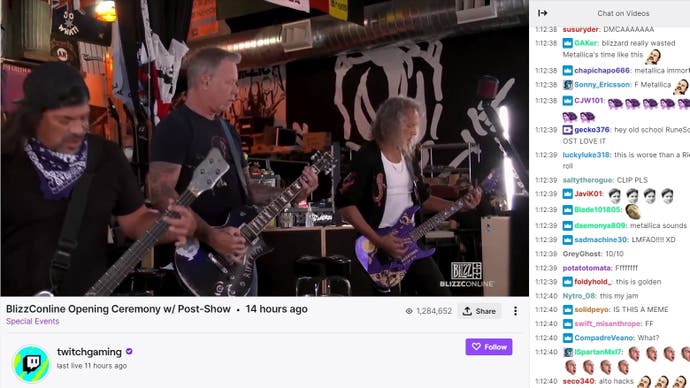Twitch replaces Metallica rocking out at BlizzConline with generic music to avoid DMCA takedown
For Whom the Bell Trolls.
Twitch replaced Metallica at the end of BlizzConline's opening ceremony with generic royalty-free music to avoid a DMCA takedown - with hilarious results.
Soon after James Hetfield and co started rocking out, the lever pullers at Twitch replaced the band's music with a plinky tune in an apparent bid to avoid potential takedowns.
This occurred on the Twitch Gaming channel, but it did not occur on other Twitch channels, such as Blizzard's own, and it did not occur on the live stream on Blizzard's YouTube channels (I was watching at the time).
It seems Twitch did not obtain the music performance rights Blizzard obtained for its channels, and so felt it prudent to replace Metallica on its official Twitch Gaming channel, which it bubbled up to Twitch's front page. Skip to the one hour and 11 minutes mark in the video below to see the "transition". As you'd expect, the chat is on point.
UPDATE: It appears Twitch has pulled the BlizzConline VOD from its Twitch Gaming channel. The video below shows what happened:
Digital Millennium Copyright Act takedowns over music on Twitch have been a source of frustration for streamers after a wave of bans issued in 2020.
In May 2020, representatives for the major record labels started sending thousands of DMCA notifications each week to Twitch that targeted creators' archives, mostly for snippets of tracks in years-old clips.
In November 2020, Twitch warned streamers not to play recorded music on their streams, and suggested they review their historical VODs and clips and delete any archives that had music in them.
Would Metallica's own record label have issued a DMCA takedown over the band's live and officially-sanctioned performance on-stream? It seems a silly question to ask, but from the looks of things Twitch didn't want to risk finding out.
Metallica's involvement in this is also interesting because of the band's history with DMCA. In the early 2000s, Metallica sued Napster for copyright infringement, paving the way for the DMCA as we know it today.


